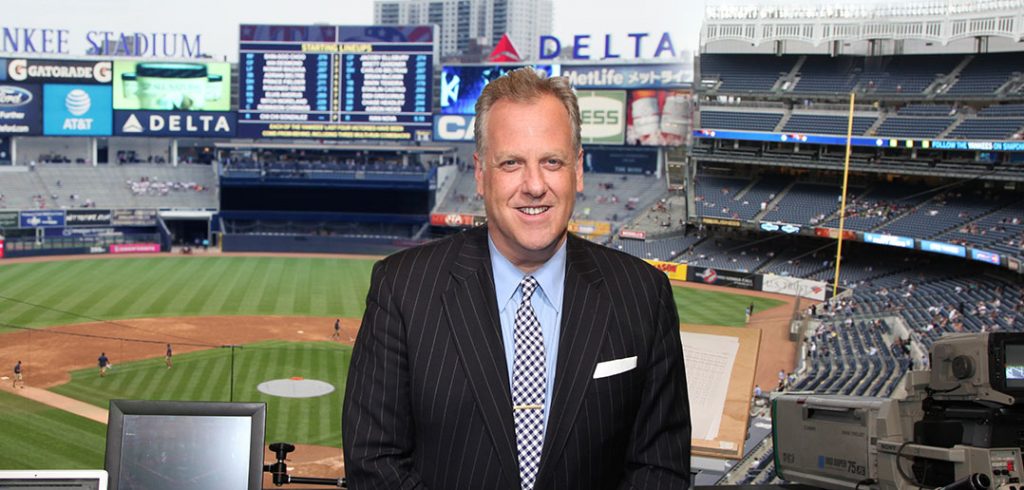Michael Kay, FCRH ’82, has long been one of leading voices in New York sports. He has covered the Yankees as a beat reporter or a radio and TV broadcaster since 1987, and for the past 16 years, he’s been the team’s lead play-by-play announcer on the YES Network. Kay hosts CenterStage on YES, interviewing sports and entertainment figures, and The Michael Kay Show on ESPN New York radio. The Bronx native and WFUV alumnus recently returned to Fordham, where he received the Vin Scully Award for Excellence in Sports Broadcasting.
Does it feel odd to get a lifetime achievement award with, hopefully, a lot of career left?
Yes! I’m wondering if someone is trying to tell me something. A few days prior to the Scully Award, I was inducted into the New York State Broadcasters Hall of Fame. I guess it’s a good thing to get them while I can still enjoy them.
Did you always know you wanted to go to Fordham and then become a sports broadcaster?
I knew I wanted to be a Yankees announcer since I was nine years old, and when my sister Debbie attended Fordham and told me about WFUV, I knew that it was the best place for me to pursue that dream. I actually wanted to be the Yankees first baseman, but I realized I couldn’t hit and didn’t enjoy getting hit by the baseball.
Are fears about the future of baseball overblown, or is the game actually in danger of losing its place as America’s pastime?
It’s not overblown. The game pace is too slow-moving. I love it the way it is, but I am not the future of the game. You have to capture young people who have come from a “microwave” society. They want things happening instantly, and baseball is not that. They need to figure out how to appeal to the younger audience while keeping the integrity of the game in place.
Why are there still so few female MLB announcers?
I wish I knew. I think sports is slow to change. And it’s not so much the decision-makers, although they have to take some of the blame, but rather the viewers and listeners who complain when something is different in their broadcast. But people like Suzyn Waldman and Doris Burke and Sarah Kustok are changing all that.
You’ve said that the “stick to sports” idea doesn’t make sense, because the political elements of sports are there, so they need to be talked about. Do you feel like, on the whole, people understand that now more than they did five years ago?
I think people have selective outrage. They want you to stick to sports when you give an opinion that they don’t agree with. Now, I would rather not go into things other than sports, but when the president brings sports into the equation, it’s hard not to talk about that.
When it comes to journalism, you expressed your disgust with last year’s layoffs at the New York Daily News. How do you convince young sports journalists—and young journalists in general—that they shouldn’t jump ship and think about another industry?
It would be hard to be honest and tell them that. The print industry is not exactly thriving, and I think that’s a bad thing for this country. If we don’t have a free, independent press, then those in power simply cannot and will not be checked. That’s dangerous. I would tell all these kids that if you become proficient at writing, there will be a job for you in the industry, either in print or behind the scenes in TV. And, of course, a good writer can always go to a thriving website, like The Athletic, and earn a good living.
How has having two young children changed the way you approach your work?
It has put it all into perspective. In the past, I was a workaholic and would take any job or new opportunity. My workaholic past certainly played a role in my present success, but now I’m happy with what I have professionally because I’m so happy personally.
What has it been like for both you and your friend from Fordham, NBA announcer Mike Breen, FCRH ’83, to succeed in the ways you have?
He is one of my best friends in the world. We are the same two guys who used to sit in the campus center at Fordham and tell each other about our dreams. He wanted to be the Knicks’ announcer and I wanted to be the Yankees’ announcer. The fact that we were privy to each other’s dreams and know how starry-eyed we were makes it sweeter to enjoy each other’s success.
You’ve been a mentor to Ryan Ruocco, FCRH ’08, and many other young announcers. What do you enjoy most about your role as a mentor?
I just like to provide whatever help I can give to a young person. I never really had that entrée into the business when I got out of college, so if I can provide a little help or lift to someone, that would be awesome and would maybe provide a couple of more speakers who have kind words at my funeral.
How did you develop your style as an announcer? Did that come out of those who taught or mentored you?
I think it happened organically and was a combination of those I listened to growing up, those I spoke with along the way, and those I worked with. You end up becoming an amalgamation of hopefully the best of the people you came across in your life.
What’s the most memorable game you’ve ever called?
Probably Game 1 of the 1998 World Series, when the Yankees scored seven runs in the seventh inning against the Padres at Yankee Stadium. After the grand slam by Tino Martinez, the stadium was literally shaking and I just leaned back and took it all in. It was pretty special.

